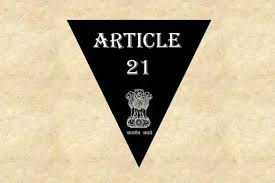
Extension of Articles 14 and 21
Extension of Articles 14 and 21
GS-2: Governance
(IAS/UPPCS)
Relevant for Prelims:
Articles 14 and 21, Right against the adverse effects of climate change, Great Indian Bustard (GIB), Article 48A, Article 51A.
Relevant for Mains:
Key views of the SC on the right against adverse impacts of climate change, Judgment, About Articles 14 and 21, Way forward, Conclusion.
09/04/2024
Source: Indian Express
Why in news:
Recently, the Supreme Court has expanded the effect of Articles 14 and 21 to include the "right against the adverse effects of climate change".
Key views of the SC relating to the right against the adverse effects of climate change:
- The Supreme Court was hearing a plea to protect the Great Indian Bustard (GIB) from losing its habitat due to power transmission lines.
- The Court has also highlighted the interconnectedness between climate change and various human rights, including the right to health, indigenous rights, gender equality and the right to development.
- The Supreme Court has expanded the Fundamental Rights chapter from time to time to include various aspects of a dignified existence.
- However, this is the first time that it has included the “right against the adverse effects of climate change”.
- The Court highlighted that “States have a duty of care to their citizens to prevent harm and ensure overall welfare and protecting the right to a healthy and clean environment is undoubtedly a part of this duty.”
Decision:
- Despite a plethora of decisions on the right to a clean environment, some recognizing climate change as a serious threat, and national policies to address climate change, it is not yet clear what rights people have against the adverse effects of climate change.
- As the devastation caused by climate change is increasing year after year, it becomes necessary to express it as a separate right.
About Article 14:
- Under Article 14 of the Fundamental Rights in Part 3 of the Indian Constitution, there is a provision for equality before law and equal protection of laws. This article of the Constitution provides for equal treatment for both Indian citizens and foreigners within the territory of India.
- The first concept i.e. ‘equality before law’ has its origin in the British system. This concept refers to the absence of privilege in favor of any individual. It means that all persons will be treated equally before the law administered by all courts within the country, whether the person is rich or poor, a government official or a private person, no one is above the law.
- The second concept i.e. ‘Equal Protection of Laws’ is inspired by the American Constitution. It implies equal treatment and equal application of the same law to all persons in equal circumstances in respect of the privileges and obligations conferred by law.
- In this way it can be said that the first concept i.e. ‘equality before law’ is a negative concept while the second ‘equal protection of law’ is positive. However, the objective of both concepts is to ensure equality of law and justice.
- This is recognized by Articles 14 and 21 which are important sources of the right to a clean environment and the right against the adverse effects of climate change.
About Article 21:
- Article 21 recognizes the right to life and personal liberty.
- It states that, no person shall be deprived of his life or personal liberty except according to procedure established by law.
- It guarantees that life or personal liberty shall not be taken away without the sanction of law. It ensures that no person can be punished or imprisoned merely on the basis of the whims of some authorities. He can be punished only for violation of law.
- A new Article 21-A has been added after Article 21 by the 86th Amendment Act of the Constitution.
- By this Amendment Act, the right to education has been made a fundamental right.
Other constitutional provisions for environmental protection:
Article 48A:
- Article 48A of the Constitution provides that the State shall endeavor to protect and improve the environment and to protect the forests and wildlife of the country.
Article 51A:
- Clause (g) of Article 51A states that it shall be the duty of every citizen of India to protect and improve the natural environment including forests, lakes, rivers and wildlife and to have compassion for living creatures.
- These are not legitimate provisions of the Constitution but the importance of the environment, as shown by these provisions, becomes a right in other parts of the Constitution.
Way forward:
- Investment in renewable energy is needed to promote rights against the adverse effects of climate change. Investing in renewable energy not only addresses these urgent environmental concerns but also brings many socio-economic benefits. However, solar and wind energy capacity has been expanded in this area.
- There is a need to fully implement international commitments by the Government of India to transition to non-fossil fuels and reduce emissions to control climate change.
Conclusion:
Fundamental rights are mentioned in Articles 14 to 32 in Part III of the Constitution of India.
These rights provide standards for conduct, citizenship, justice, freedom and equality. Various social, religious, economic and political problems in India make fundamental rights important. These rights are justiciable, which means that if these rights are violated by the government or anyone else, the individual has the right to approach the Supreme Court or High Courts for the protection of his fundamental rights.
------------------------------------------------
Mains Question:
Explain the rationale for expanding the scope of Articles 14 and 21 to rights against the adverse effects of climate change.